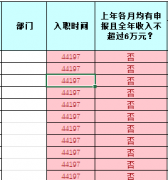问题描述
我有一个可以下载的 excel 文件..例如 NAME.xlsx 它在 firefox 中运行良好,但在 webkit(safari/chrome) 中它也附加到名称后 扩展名 .xhtml 所以然后将其命名为 NAME.xlsx.html 它应该是 ONLY .xlsx
I have an excel file which can be downloaded..for example NAME.xlsx well it works in firefox but in webkit(safari/chrome) it appends to the name also the extension .xhtml so then name it will be NAME.xlsx.html it should be ONLY .xlsx
这是我的标题:
$objWriter = new PHPExcel_Writer_Excel2007($objPHPExcel);
$objWriter->save($root.'/application/to_excel/KSW.xlsx');
$this->getResponse()->setHeader('Content-type', 'application/download', true);
$this->getResponse()->setHeader('Content-type', 'application/octet-stream', true);
$this->getResponse()->setHeader('Content-type', 'application/vnd.openxmlformats-officedocument.spreadsheetml.sheet', true);
$this->getResponse()->setHeader('Content-disposition', 'attachment;filename='.basename($root.'/application/to_excel/KSW.xlsx').'', true);
$this->getResponse()->setHeader('Cache-Control', 'max-age=0', true);
那么我做错了什么?
推荐答案
我还没有遇到此功能失败的情况——它适用于我迄今为止在 Safari (Windows) 中尝试过的所有 Office 2007/2010 文件和铬.get_known_mime_types() 函数只返回一个包含我的应用程序支持的所有 mime 类型的巨大数组——只需谷歌搜索您需要的 MIME 类型.$file 是主机上文件的实际路径,$name 是显示在下载(运行/保存)对话框中的文件名.我也对我从中获得大部分收益的地方给予了应有的信任.希望你也有好运:
I've not had this function fail yet -- it works with all the Office 2007/2010 files that I've tried so far in Safari (Windows) and Chrome. The get_known_mime_types() function just returns a giant array of all the mime-types that my app supports -- just Google for the MIME types you need. $file is the actual path to the file on your host, and $name is the file name that displays in the download (run/save) dialog. I've also given due credit to the place I got most of it from. Hope you have luck with it too:
function file_download($file, $name, $mime_type='') {
/* The majority of this code was taken from:
* http://w-shadow.com/blog/2007/08/12/how-to-force-file-download-with-php/
*
* So a big thanks to them.
* I have modified parts of it, though, so it's not 100% borrowed.
*/
if(!is_readable($file)) die('File not found or inaccessible!');
$size = filesize($file);
$name = rawurldecode($name);
/* Figure out the MIME type (if not specified) */
$known_mime_types = get_known_mime_types();
if($mime_type==''){
$file_extension = strtolower(substr(strrchr($file,"."),1));
if(array_key_exists($file_extension, $known_mime_types)){
$mime_type=$known_mime_types[$file_extension];
} else {
$mime_type="application/force-download";
}
}
@ob_end_clean(); //turn off output buffering to decrease cpu usage
// required for IE, otherwise Content-Disposition may be ignored
if(ini_get('zlib.output_compression')) {
ini_set('zlib.output_compression', 'Off');
}
header('Content-Type: ' . $mime_type);
header('Content-Disposition: attachment; filename="'.$name.'"');
header("Content-Transfer-Encoding: binary");
header('Accept-Ranges: bytes');
/* The three lines below basically make the download non-cacheable */
header("Cache-control: private");
header('Pragma: private');
header("Expires: Mon, 26 Jul 1997 05:00:00 GMT");
// multipart-download and download resuming support
if(isset($_SERVER['HTTP_RANGE'])) {
list($a, $range) = explode("=",$_SERVER['HTTP_RANGE'],2);
list($range) = explode(",",$range,2);
list($range, $range_end) = explode("-", $range);
$range=intval($range);
if(!$range_end) {
$range_end=$size-1;
} else {
$range_end=intval($range_end);
}
$new_length = $range_end-$range+1;
header("HTTP/1.1 206 Partial Content");
header("Content-Length: $new_length");
header("Content-Range: bytes $range-$range_end/$size");
} else {
$new_length=$size;
header("Content-Length: ".$size);
}
/* output the file itself */
$chunksize = 1*(1024*1024); // 1MB, can be tweaked if needed
$bytes_send = 0;
if ($file = fopen($file, 'r')) {
if(isset($_SERVER['HTTP_RANGE'])) {
fseek($file, $range);
}
while(!feof($file) && (!connection_aborted()) && ($bytes_send<$new_length)) {
$buffer = fread($file, $chunksize);
print($buffer); //echo($buffer); // is also possible
flush();
$bytes_send += strlen($buffer);
}
fclose($file);
} else {
die('Error - can not open file.');
}
die();
}
这篇关于Webkit 和 Excel 文件(PHPexcel)的文章就介绍到这了,希望我们推荐的答案对大家有所帮助,也希望大家多多支持跟版网!



 大气响应式网络建站服务公司织梦模板
大气响应式网络建站服务公司织梦模板 高端大气html5设计公司网站源码
高端大气html5设计公司网站源码 织梦dede网页模板下载素材销售下载站平台(带会员中心带筛选)
织梦dede网页模板下载素材销售下载站平台(带会员中心带筛选) 财税代理公司注册代理记账网站织梦模板(带手机端)
财税代理公司注册代理记账网站织梦模板(带手机端) 成人高考自考在职研究生教育机构网站源码(带手机端)
成人高考自考在职研究生教育机构网站源码(带手机端) 高端HTML5响应式企业集团通用类网站织梦模板(自适应手机端)
高端HTML5响应式企业集团通用类网站织梦模板(自适应手机端)